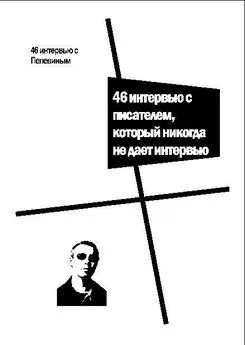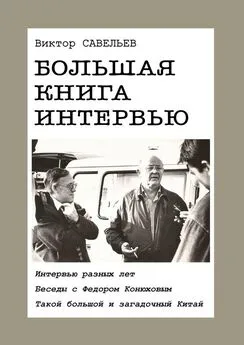Виктор Пелевин - 46 интервью с Пелевиным. 46 интервью с писателем, который никогда не дает интервью
- Название:46 интервью с Пелевиным. 46 интервью с писателем, который никогда не дает интервью
- Автор:
- Жанр:
- Издательство:неизвестно
- Год:неизвестен
- ISBN:нет данных
- Рейтинг:
- Избранное:Добавить в избранное
-
Отзывы:
-
Ваша оценка:
Виктор Пелевин - 46 интервью с Пелевиным. 46 интервью с писателем, который никогда не дает интервью краткое содержание
46 интервью с Виктором Пелевиным с сайта pelevinlive.ru, для удобства чтения представленные в fb2. Дополнено расшифровкой двух видеоинтервью.
46 интервью с Пелевиным. 46 интервью с писателем, который никогда не дает интервью - читать онлайн бесплатно полную версию (весь текст целиком)
Интервал:
Закладка:
Nearly anywhere else, this remark would seem like a harmless expression of artistic self-assertion. But no country is more haunted by the spirit of its dead writers than Russia; even today writers still occupy an emblematic position in society. Yet just as Moscow has escaped its Communist torpor for the willful chaos of post-Soviet life, so the Russian image of the novelist is no longer that of reverent seer or even heroic dissident. Rather, if anyone embodies the new image of the writer in Russia it is the 38-year-old Pelevin, a laconic semi-recluse with a shaved head, a fashionable interest in Zen meditation and an eccentric attachment to dark glasses. (He is seldom seen without them.)
Even as pulp fiction and pornography increasingly fill Moscow bookstalls, Pelevin has emerged as that unusual thing: a genuinely popular serious writer. He is almost alone among his generation of Russian novelists in speaking with a voice authentically his own, and in trying to write about Russian life in its current idiom. It’s a finger-clickingly contemporary voice: wry, exaggerated, wised-up, amused. His mode of writing about low life in a high style, his talent for the fantastic and the grotesque and his interest in drugs, computer games and junk culture have resonated with a generation for whom the novel was becoming too slow a form. And he is, unlike many fellow Russian writers whose fiction is largely preoccupied with the trauma of the Soviet past, not in flight from present difficulties. In fact, he embraces them with the ruthless ardor of a child pulling wings off a butterfly.
’’Generation P,’’ Plevin’s most recent novel, was a summer sensation in Russia, selling more than 200,000 copies. (The translation to English is still being completed.) The book tracks the adventures of a skeptical intellectual, Vavilen Tatarsky, who becomes a kopiraiter — an advertising copywriter — adrift in a glamorously corrupt Moscow. He spends his days devising Russian versions of Western slogans: ’’Gucci for Men — Be a European, Smell Better.’’
The title is clearly a reference to America’s jaded Generation X. But what does the ’’P’’ mean? ’’It could mean any one of three things,’’ Pelevin says. ’’It could stand for Pepsi, or Pelevin, or’’ — he uses a vulgar Russian slang term that can be translated loosely as ’’absolute catastrophe’’ — or all three of these at once.’’ So Pelevin’s generation of liberal freedoms and designer excesses is also the generation of criminality, corruption and despair. ’’I feel disgusted by everything about my country,’’ he says. ’’In the Soviet times you could escape from the evil of the state by withdrawing into the private spaces of your own head; but now the evil seems to be diffused everywhere. We are all tainted by it.’’
Spend any time in Moscow and you will soon discover that no other writer polarizes opinion quite like Victor Pelevin. To the influential critic Andrei Nemzer, he is an ’’infantile writer producing books for an infantile society.’’ To Igor Shaitanov, a professor of literature at the Russian State Humanities University, Pelevin is a ’’phony’’ whose fiction has a ’’dangerous emptiness.’’ And yet, step outside the cloistered world of Moscow’s literary intelligentsia, and you will find fierce adherents. Natasha Perova, the editor who first discovered him, calls Pelevin ’’the voice of a generation, who is taking the Russian novel in new directions.’’
Pelevin’s most committed readers — those who post his short stories on the Internet and swap his books at nightclubs as if they were samizdat — are the disaffected young, who must see something of the surreality of their own lives reflected in his cool, ironic prose. ’’He’s the only writer who seems to be writing about the way we live today, with all its absurdities and heartaches,’’ says Katya Loktova, a 19-year-old student at Moscow State University.
Pelevin smiles when I ask him about his young readers. ’’You know,’’ he says, ’’they ask me the strangest questions. ’Mr. Pelevin,’ they say, ’have you ever made love while on Ecstasy?’ Other writers are asked what they think about Yeltsin or the NATO intervention in Yugoslavia’’ — he begins to laugh — but I’m asked about sex and Ecstasy.’’ Pelevin has become such an icon for Russian youth that the country’s new Green Party tried to enlist him this past fall as its candidate for prime minister in 2000. ’’At first I was flattered to be asked,’’ Pelevin told me. ’’But when I thought about it I was disgusted. I didn’t want my image exploited in this way. Politics in Russia is all about which group of people can control the most money. The Greens are no different.’’
The disjunction between those who think Pelevin is a fraud and those who see him as the ideal chronicler of the new Russia was dramatized strikingly when his 1996 novel ’’Chapaev and Emptiness’’ (to be published in the United States by Viking this spring as ’’Buddha’s Little Finger’’) was excluded from the short-list of that year’s Russian Booker Prize, the country’s pre-eminent fiction award. Igor Shaitanov was chairman of the judges that year, and he defended his jury’s unpopular decision by likening the novel — a hallucinatory recasting of the life of Vasily Chapaev, a mythical Bolshevik hero — to a computer virus. ’’It’s just too dangerous to support or transmit this kind of cultural image,’’ Shaitanov said. ’’Works like this act like a cultural virus — they destroy the cultural memory.’’
In October, the same Booker drama was tediously repeated when ’’Generation P’’ was ignored by the judges. When asked about it, Pelevin was imperiously unconcerned. ’’I expect nothing less from the literary establishment,’’ he said. ’’They know I have no interest in their world of committees, reviews and prizes. All I can say is that my books have now sold almost one million copies in Russia. I have my readership. The Booker means nothing to me.’’
While he may disparage his critics as ’’incredibly stupid, mean, venomous,’’ Pelevin has deliberately detached himself from the Russian literary mainstream, refusing to attend parties, readings or conferences. He reads very few, if any, of his peers. He cites the Russian satirist Mikhail Bulgakov as an influence, yet expresses deeper affection for foreign writers: Franz Kafka, Hermann Hesse and, even more unfashionably, Robert M. Pirsig, author of ’’Zen and the Art of Motorcycle Maintenance.’’ ’’I want no part of any literary world,’’ Pelevin told me. ’’The only thing that matters to me is trying to produce something that’s true to my vision and that people want to read. To me celebrity is virtual. That you have your picture in the papers. Big deal.’’
In his own country, at least, Pelevin never gives interviews and refuses to be photographed or appear on television or radio. Very few people even know what he looks like. What he desires most — or so he claims — is to be ignored, to be left alone in peace to write and dream. ’’Part of the attraction of Buddhism for me is that it enables me to empty my head of all the junk of modern living,’’ he says. ’’I really hate all the attention. It’s harmful to me and stops me from getting on with my work. I can only begin writing again once I know that people have forgotten about me.’’
Such willed withdrawal from the ephemera of celebrity culture to which Russia is as much attached as any country in the West has, naturally, only increased Pelevin’s allure. Who is this reclusive Buddhist in the dark glasses who writes such strange, penetrating novels? Is he for real? Russian Vogue was so eager to secure an interview with Pelevin this past summer that a senior editor invited him out for lunch and then secretly recorded their entire conversation. She confessed her subterfuge only at the end of their lunch. ’’By then,’’ Pelevin says: ’’I was too drunk to care.’’ As for the ever-present dark glasses, he says, ’’I’m naturally shy. I hate physical attention. It’s torture. I’m wearing these sunglasses now while I’m talking to you and in pictures because it’s the only way I can be photographed without being photographed, if you see what I mean.’’
Pelevin and I are chatting in a sushi bar on the old Arbat, the main tourist drag of the city. After a late summer heat wave during which temperatures climbed uncharacteristically into the low 90’s, the severe cold has returned. The extremity of the weather finds an echo in the extremity of life in the city itself: there is war in the Caucasus, unease on the streets after a terrorist bombing campaign and gossip about the ailing Yeltsin giving way to Putin, a former K.G.B. hardliner, a succession that would take place, symbolically, on the very last day of the old century. The new Moscow seems to be passing inexorably through its Weimar phase — it is an intoxicating, dangerous place, where taxes and wages go mostly unpaid, where citizens openly drive stolen cars and where voracious prostitutes, their lips swelled by collagen injections, patrol the corridors of the international hotels.
Pelevin remains at once exhilarated and repelled by this near-anarchy. In September, he packed up again, first staying two months in Germany before moving on to South Korea, where he planned ’’to avoid the millennium hype’’ by spending the winter months deep in meditation among the Buddhist monks. ’’When I’m away in Korea, spending all day meditating, everything in the world seems to disappear into silence,’’ he says. ’’I stop smoking, I’m disciplined and I can concentrate on what’s important. Living in Russia drains you if you’re an intelligent person. We have no civil society, and people have no protection from corrupt rule. Ordinary people are much worse off than they were under Communism; you simply cannot survive on your pension or money from the state.’’ Pelevin himself is fortunate; he now earns around $50,000 a year from his writing, making him wealthy by typical Russian standards — and allowing him to escape the country for months at a time.
Unusually for a Russian writer, he did not grow up surrounded by writers, intellectuals and dissidents. His parents were part of the old-style Soviet nomenklatura: his father was a military officer, and his mother was an economist from the Russian enclave of the former Soviet republic of Kazakhstan. He remembers the long summers of his boyhood being spent happily on a Moscow army base. ’’I really loved the place, actually,’’ he recalls. ’’It was like a big playground full of soldiers, a great place to excite the imagination.’’
Memories from this period informed his first novel, ’’Omon Ra’’ (1993), set during the long stagnation of the Brezhnev years. As a child, Omon is fascinated by flight and deep space and dreams of becoming a cosmonaut, a heroic Soviet man in the model of Yuri Gagarin. In his late teens, he enrolls as a cadet at the Zaraisk flying school and begins a grueling training program. His aptitude and diligence impress the authorities, and soon he is selected to be the sole pilot on a one-way, supposedly ’’unmanned’’ mission to the dark side of the moon. Omon realizes that such a journey means certain death, his death, but he has no choice and sets off for the moon only to discover, at the end of the novel, that his ship never really left the ground, that the entire Soviet space program is an elaborately choreographed fake. Pelevin’s satire, written in the immediate aftermath of Communism’s fall and scornful of the heroic bombast of the past, had all the daring and swaggering hauteur of a young man’s debut. Richard Bernstein, writing in The Times in 1996, praised ’’Ra’’ as ’’wicked, clever and poetic.’’
Читать дальшеИнтервал:
Закладка:



